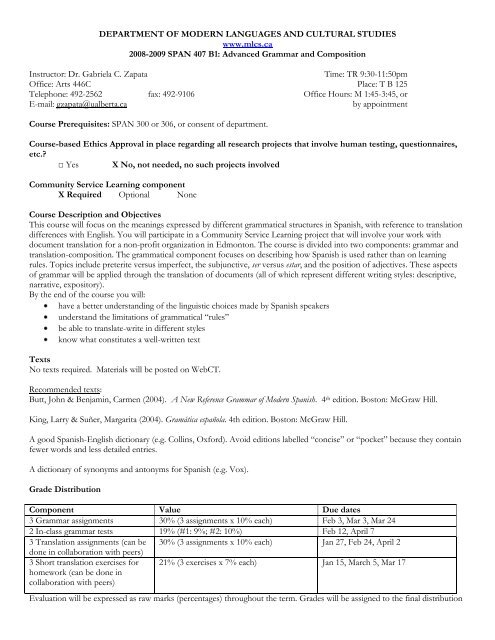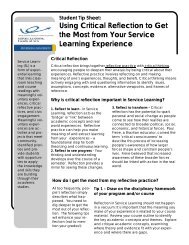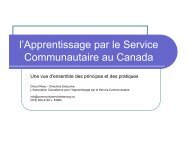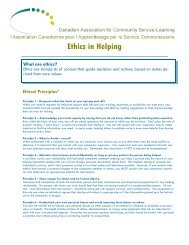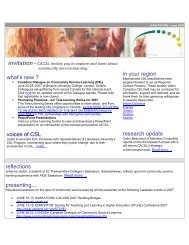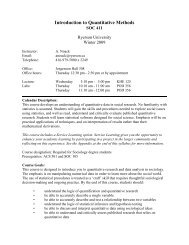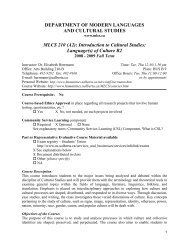SPAN 407 B1 - Canadian Association for Community Service Learning
SPAN 407 B1 - Canadian Association for Community Service Learning
SPAN 407 B1 - Canadian Association for Community Service Learning
Create successful ePaper yourself
Turn your PDF publications into a flip-book with our unique Google optimized e-Paper software.
DEPARTMENT OF MODERN LANGUAGES AND CULTURAL STUDIES<br />
www.mlcs.ca<br />
2008-2009 <strong>SPAN</strong> <strong>407</strong> <strong>B1</strong>: Advanced Grammar and Composition<br />
Instructor: Dr. Gabriela C. Zapata<br />
Time: TR 9:30-11:50pm<br />
Office: Arts 446C Place: T B 125<br />
Telephone: 492-2562 fax: 492-9106 Office Hours: M 1:45-3:45, or<br />
E-mail: gzapata@ualberta.ca<br />
by appointment<br />
Course Prerequisites: <strong>SPAN</strong> 300 or 306, or consent of department.<br />
Course-based Ethics Approval in place regarding all research projects that involve human testing, questionnaires,<br />
etc.?<br />
□ Yes X No, not needed, no such projects involved<br />
<strong>Community</strong> <strong>Service</strong> <strong>Learning</strong> component<br />
X Required Optional None<br />
Course Description and Objectives<br />
This course will focus on the meanings expressed by different grammatical structures in Spanish, with reference to translation<br />
differences with English. You will participate in a <strong>Community</strong> <strong>Service</strong> <strong>Learning</strong> project that will involve your work with<br />
document translation <strong>for</strong> a non-profit organization in Edmonton. The course is divided into two components: grammar and<br />
translation-composition. The grammatical component focuses on describing how Spanish is used rather than on learning<br />
rules. Topics include preterite versus imperfect, the subjunctive, ser versus estar, and the position of adjectives. These aspects<br />
of grammar will be applied through the translation of documents (all of which represent different writing styles: descriptive,<br />
narrative, expository).<br />
By the end of the course you will:<br />
have a better understanding of the linguistic choices made by Spanish speakers<br />
understand the limitations of grammatical “rules”<br />
be able to translate-write in different styles<br />
know what constitutes a well-written text<br />
Texts<br />
No texts required. Materials will be posted on WebCT.<br />
Recommended texts:<br />
Butt, John & Benjamin, Carmen (2004). A New Reference Grammar of Modern Spanish. 4 th edition. Boston: McGraw Hill.<br />
King, Larry & Suñer, Margarita (2004). Gramática española. 4th edition. Boston: McGraw Hill.<br />
A good Spanish-English dictionary (e.g. Collins, Ox<strong>for</strong>d). Avoid editions labelled “concise” or “pocket” because they contain<br />
fewer words and less detailed entries.<br />
A dictionary of synonyms and antonyms <strong>for</strong> Spanish (e.g. Vox).<br />
Grade Distribution<br />
Component Value Due dates<br />
3 Grammar assignments 30% (3 assignments x 10% each) Feb 3, Mar 3, Mar 24<br />
2 In-class grammar tests 19% (#1: 9%; #2: 10%) Feb 12, April 7<br />
3 Translation assignments (can be 30% (3 assignments x 10% each) Jan 27, Feb 24, April 2<br />
done in collaboration with peers)<br />
3 Short translation exercises <strong>for</strong><br />
homework (can be done in<br />
collaboration with peers)<br />
21% (3 exercises x 7% each) Jan 15, March 5, Mar 17<br />
Evaluation will be expressed as raw marks (percentages) throughout the term. Grades will be assigned to the final distribution
<strong>SPAN</strong> <strong>407</strong> Winter 09 Page - 2 - of 5<br />
of mark totals <strong>for</strong> the course. Grade assignment will be based on a combination of absolute achievement and relative<br />
per<strong>for</strong>mance in the class. The following guidelines have been adopted by the Department of Modern Languages and Cultural<br />
Studies:<br />
Letter % Pts Descriptor<br />
A+ 95-100% 4.0 Outstanding: Superior per<strong>for</strong>mance showing understanding and knowledge of<br />
the subject matter far exceeding expectations.<br />
A 90-94% 4.0 Excellent: Superior per<strong>for</strong>mance showing comprehensive understanding of<br />
subject matter.<br />
A- 86-89% 3.7 Very good: Clearly above average per<strong>for</strong>mance with complete knowledge of<br />
subject matter.<br />
B+ 82-85% 3.3 Very good<br />
B 75-81% 3.0 Good: average per<strong>for</strong>mance with knowledge of subject matter generally<br />
complete.<br />
B- 70-74% 2.7 Good<br />
C+ 66-69% 2.3 Satisfactory: Basic understanding of the subject matter<br />
C 61-65% 2.0 Satisfactory<br />
C- 58-60% 1.7 Satisfactory<br />
D+ 55-57% 1.3 Minimal Pass: Marginal per<strong>for</strong>mance; generally insufficient preparation <strong>for</strong><br />
subsequent courses in the subject matter.<br />
D 50-54% 1.0 Minimal Pass: Marginal per<strong>for</strong>mance; generally insufficient preparation <strong>for</strong><br />
subsequent courses in the subject matter.<br />
F 0-49% 0.0 Fail: Unsatisfactory per<strong>for</strong>mance or failure to meet course requirements.<br />
Required Notes:<br />
“Policy about course outlines can be found in Section 23.4(2) of the University Calendar.” (GFC 29 SEP 2003).<br />
“The University of Alberta is committed to the highest standards of academic integrity and honesty. Students are expected to<br />
be familiar with these standards regarding academic honesty and to uphold the policies of the University in this respect.<br />
Students are particularly urged to familiarize themselves with the provisions of the Code of Student Behaviour (online at<br />
www.ualberta.ca/secretariat/appeals.htm) and avoid any behaviour which could potentially result in suspicions of cheating,<br />
plagiarism, misrepresentation of facts and/or participation in an offence. Academic dishonesty is a serious offence and can<br />
result in suspension or expulsion from the University.” (GFC 29 SEP 2003)<br />
Plagiarism and Cheating:<br />
All students should consult the University Calendar, pp. 728-751, http://www.uofaweb.ualberta.ca/TIE/, regarding the<br />
definitions of inappropriate academic behaviour (section 30.3.2) and its consequences when detected.<br />
Students should be aware that, while seeking the advice of native or expert speakers is often helpful, excessive editorial and<br />
creative help in assignments is considered a <strong>for</strong>m of “cheating” that violates the code of student conduct with dire<br />
consequences. “No student shall represent another’s substantial editorial or compositional assistance on an assignment as<br />
their own. No student shall submit in any course or program of study, without the written approval of the course instructor,<br />
all or a substantial portion of any academic work <strong>for</strong> which credit has been obtained by the student or which has previously<br />
been or is being submitted by the student in another course or program of study in the University or elsewhere.”<br />
An instructor who has reason to believe that a student has handed in work that he or she could not possibly reproduce<br />
without outside assistance is obliged, out of consideration of fairness to other students, to report the case to the Associate<br />
Dean of the Faculty. In case of questions or doubts, please discuss this matter with your instructor.<br />
Description of Assignments and Tests:<br />
Consult section 23.4.3 of the University Calendar <strong>for</strong> the definition of excused absence.<br />
As there is no textbook in this course, the student is responsible <strong>for</strong> obtaining the materials from any classes
<strong>SPAN</strong> <strong>407</strong> Winter 09 Page - 3 - of 5<br />
missed.<br />
GRAMMAR<br />
The grammar assignments and the in-class tests will involve analysis of the use of the structures of Spanish that we examine in<br />
class. Your responses must be written in Spanish; however, you will not be graded on the “correctness” of your Spanish as<br />
long as it’s comprehensible.<br />
All assignments must be handed in on the date indicated unless arrangements have been made with the instructor be<strong>for</strong>e the<br />
due date. An assignment is considered submitted when the instructor has it in hand. In cases of illness or other emergency,<br />
the student is responsible <strong>for</strong> notifying the instructor as soon as possible. Late assignments will not be accepted.<br />
The in-class tests must be written on the indicated date. No absences will be allowed. In the case of illness or other<br />
emergency, the student must contact the instructor immediately. Written documentation will be requested.<br />
TRANSLATION EXERCISES AND HOMEWORK: CSL Component<br />
A. COMMUNITY SERVICE-LEARNING (CSL) COMPONENT – What is CSL?<br />
<strong>Community</strong> <strong>Service</strong>-<strong>Learning</strong> integrates community-based activities with classroom learning. Students volunteer with a nonprofit<br />
community organization. In this course, students will contribute to an organization by translating vital documents that<br />
will facilitate its work with Spanish speakers in the community. For further in<strong>for</strong>mation about CSL:<br />
http://www.uofaweb.ualberta.ca/arts/CSLhome.cfm.<br />
B. ASSIGNMENTS AND HOMEWORK EXERCISES<br />
Each translation assignment and homework exercise will be based on the documents provided by the CSL organization<br />
chosen <strong>for</strong> this class, and it will be typed and double-spaced (including drafts, please). The documents to be translated will be<br />
discussed in class, and they will be divided up among different members of the class. Students will be allowed to work with<br />
peers who have been assigned the same text.<br />
All assignments and homework exercises must be handed in on the date indicated unless arrangements have been made with<br />
the instructor be<strong>for</strong>e the due date. An assignment is considered submitted when the instructor has it in hand. In cases of<br />
illness or other emergency, the student is responsible <strong>for</strong> notifying the instructor as soon as possible. Late assignments will<br />
not be accepted.<br />
The assignments and homework exercises will be evaluated as if they were a composition/written assignment, with the<br />
instructor’s taking into account content, organization, language, and mechanics.<br />
Schedule (subject to change):<br />
Date Topic Assignments and Quizzes<br />
Jan 6 Introduction-CSL texts<br />
Jan 8 CSL texts-Translation-Writing basics<br />
Jan 13 Ser and estar<br />
Jan 15 CSL texts: Writing styles Translation Homework #1<br />
Jan 20 Position of adjectives<br />
Jan 22 CSL texts<br />
Jan 27 Tense and aspect; non-finite verb <strong>for</strong>ms Translation Assignment #1<br />
Jan 29 CSL texts<br />
Feb 3 Preterite and imperfect Grammar assignment #1<br />
Feb 5 CSL texts<br />
Feb 10 Middle voice (se)<br />
Feb 12 In-class grammar test #1 In-class grammar test #1
Feb 17 Winter term reading week – no class<br />
Feb 19 Winter term reading week – no class<br />
Feb 24 Definite and indefinite articles Translation Assignment #2<br />
Feb 26 CSL texts<br />
Mar 3 Personal a Grammar assignment #2<br />
Mar 5 CSL texts Translation Homework #2<br />
Mar 10 Subjunctive (1)<br />
Mar 12 CSL texts<br />
Mar 17 Subjunctive (2) Translation Homework #3<br />
Mar 19 CSL texts<br />
Mar 24 Word order Grammar assignment #3<br />
Mar 26 Translation Assignment #3<br />
Mar 31 Translation Assignment #3<br />
Apr 2 Review <strong>for</strong> grammar test #2 Translation Assignment #3<br />
Apr 7 In-class grammar test #2 In-class grammar test #2<br />
<strong>SPAN</strong> <strong>407</strong> Winter 09 Page - 4 - of 5
<strong>SPAN</strong> <strong>407</strong> Winter 09 Page 5 of 5<br />
Grading rubric <strong>for</strong> compositions<br />
Criteria<br />
Content 10%<br />
Do ideas convey the same meaning as the original English document?<br />
Are the ideas well-developed?<br />
Does the paper fulfill the assignment criteria?<br />
Organization 25%<br />
Is there good transition between ideas, including the use of transition<br />
words?<br />
Is each paragraph a coherent unit?<br />
Does the paper follow the requirements of the assigned style?<br />
Language 45%<br />
Is the vocabulary varied and the repetition of the same words avoided?<br />
Do words convey the same meaning as the original English terms?<br />
Are words used precisely, with an avoidance of vague terms (e.g.<br />
“bueno”)?<br />
Is the paper written with an appropriate tone and register?<br />
Are anglicisms avoided and Spanish structures used?<br />
Mechanics 20%<br />
Punctuation<br />
Spelling<br />
Absence of run-on sentences or incomplete sentences<br />
Number and gender agreement<br />
Correct use of verbs<br />
Other basic grammatical errors<br />
Excellent<br />
few problems, text<br />
reads well<br />
Good<br />
several problems but<br />
they don’t bother reader<br />
OK<br />
several problems that<br />
bother the reader but<br />
don’t impede<br />
comprehension<br />
9-10 7-8 6 ≤5<br />
27-30 21-26 18-20 ≤17<br />
36-40 28-35 24-27 ≤23<br />
18-20 14-17 12-13 ≤11<br />
Poor<br />
many problems that<br />
impede comprehension


